- Home
- Annie Proulx
That Old Ace in the Hole Page 3
That Old Ace in the Hole Read online
Page 3
Wayne Redpoll had come by the nickname “Bromo” after a night of heavy drinking not long after Bob Dollar arrived on the doorstep. He moaned with a hangover, drank black coffee to restore balance, said, “Goddamn, I’m going for a walk to clear my head,” ended at Chickee’s place down the street where he ordered a Bromo-Seltzer to settle his queasy gut. He swallowed the gassy mixture and within seconds puked on the counter.
He had a habit of holding his words behind his teeth, only letting them escape through the narrowest possible opening of his jaws, which gave his conversation a constricted sibilance. He had many dislikes. He hated the “drink milk” campaign that showed celebrities holding empty glasses of milk, their upper lips white with the stuff as though they drank like tapirs. Hijackers aside, he loathed flying, especially the attendants’ merry commands to pull down the window shades so other passengers could watch grade-Z American movies. He refused to lower his shade, saying that the only pleasure in flying was the chance to look at the landscape from thirty-five thousand feet. Once he had been put off the plane in Kansas City for daring to argue about it. Tam had driven hundreds of miles to pick him up and listened all the way back to Bromo’s rant about the horrible streets he had walked through while waiting. Phrases offered to the grief-stricken, such as “time heals all wounds” and “the day will come when you reach closure” irritated him, and there were times when he sat silent, seeming half-buried in some sediment of sorrow.
“Closure? When someone beloved dies there is no ‘closure.’”
He disliked television programs featuring tornado chasers squealing “Big one! Big one!” and despised the rat-infested warrens of the Internet, riddled with misinformation and chicanery. He did not like old foreign movies where, when people parted, one stood in the middle of the road and waved. He thought people with cell phones should be immolated along with those who overcooked pasta. Calendars, especially the scenic types with their glowing views of a world without telephone lines, rusting cars or burger stands, enraged him, but he despised the kittens, motorcycles, famous women and jazz musicians of the special-interest calendars as well.
“Why not photographs of feral cats? Why not diseases?” he said furiously. Wal-Mart trucks on the highway received his curses and perfumed women in elevators invited his acid comment that they smelled of animal musk glands. For years he had been writing an essay entitled “This Land Is NOT Your Land.”
Even though they did not get along, Bromo had opened a charge account for Bob at the local bookshop where he was allowed to buy one book every two weeks. Bob’s longing for the books had overcome his dislike of any obligation to Bromo.
When donation boxes came to the shop’s doorstep he offered scathing criticism of the contents. Once a strange garment arrived in a box stamped OUTDOOR GRILL DELUXE. It was an enormous vest made of an unidentified fur, coarse, long and brownish grey. It smelled of old smoke and mothballs.
“A beast!” cried Bromo in mock horror, backing away from it. “Good God, that’s something from the sixties, some mountain commune garment. Feel in the pockets, Tam, see if there’s any drugs.”
The pockets were empty. Bromo disliked the vest, which reminded him of paisley skirts, peace signs, girls doctoring their children with coltsfoot and yarrow; he was particularly irked at being unable to identify the fur. At last he could stand it no longer, wrapped the vest up, took it to the Denver Natural History Museum.
“Pass the macaroni, Bob,” said Uncle Tam that evening. Then, to Bromo, “Aren’t you going to tell us what they said at the museum?”
“You really want to know?”
“Of course I want to know. It’s a very unusual fur.”
Bromo snorted. “You can say that again. It’s also highly illegal. It is grizzly bear fur.”
“Oh no,” said Uncle Tam who was an ardent environmentalist with lifetime subscriptions to Audubon, High Country News, Mother Nature, Wildlife of the Rockies and Colorado Wildlife.
There followed a long discussion—argument—about what to do with “the Beast,” as Bromo persisted in calling it. In the end it got a spotlighted solo place on a table with a sign reading UNIQUE BEAR-SKIN VEST and a price tag of $200.
The two men were housemates and business partners and, Bob wondered a few years later, if perhaps not something more, for there was in their relationship an odd intimacy that went beyond household or business matters. Yet he had never seen any affectionate glances or touching between them. Each man had his own bedroom at opposite ends of the upstairs hall. But neither did they ever bring women to the house. It was a poor bachelor establishment (though tidy and well-dusted), for the partners made very little money. In the end Bob decided that the sexual gears of both men (and perhaps his own) were engaged in neutral, except for one peculiar and inexplicable memory of Bromo Redpoll in Santa Fe sitting on the hotel shoeshine throne for the third time in one day, an expression on his face that nine-year-old Bob could only characterize as “adult,” while a Mexican boy snapped his rag over a glossy wingtip. When Bob was older he grasped the sexual content of that expression and he had a word for it—concupiscence—for he had seen it on his own face, though not in longing for a shoeshine boy, but for the sluts of Front Range High, as distant to him as calendar photographs. He imagined himself with a sultry, curly-headed, dimpled girl, but it had not worked out that way. Bob was not tall but by some stroke of genetic luck he was well-proportioned with smooth musculature, a hard little ass and boxy shoulders. As Bob matured, the unbidden thought had come to Tam that the boy was, as Wayne might say, “a casserole.”
There were no dimpled girls with curly hair at Front Range High and in his junior year he had been picked out by a big, unclean girl with a muddy complexion, Marisa Berdstraw, who wore lipstick of a dark red color that made her teeth glow beaver yellow. She had quickly inveigled him into a sexual servitude with all the declarations and trappings of professed love but none of the reality. This meant going steady, studying together, a Friday or Saturday night movie, a sex grapple on Sunday mornings when her parents, both with mottled, rough faces, were at church. He did what she said and she had a pattern of events and behavior worked out in her mind. She would call up in the evening.
“What ya doin?”
“Studying for a social studies test.”
“I got a test too. In Diagonals. But I’m not studyin for it. It’s more like a quiz.”
Diagonals was an experimental course that darted tangentially from subject to subject as classroom discussion ranged. It had started off as a geology unit, veered to Esperanto, slid to the court of Louis XVI, on to the Whiskey Rebellion, the Oklahoma land rush, then to fractals, to oil tanker construction and, most recently, to mathematical calculation with an abacus.
“Only three more days till Sunday,” she said archly.
“Yeah.”
“Are you glad?”
“Glad about what? That there’s three more days?”
“That it’s only three more days.”
“Sure.”
But he wasn’t that glad. The encounters in her gritty sheets, awash in her strong body odors, left him restless and disappointed. He wanted a few things to be different. But Marisa did have a hearty laugh and a certain sense of humor, though based on pain and accident. He had only once brought her to the apartment. She made it clear that she thought the apartment a cramped hole and Uncle Tam something of an idiot, nice but quite dumb.
“He’s vague, you know? Not with it, is he?”
It was neither sorrow nor relief that he felt when she told him they had to break up.
“I’m not going with you anymore,” she said. “There’s another guy.”
Soon enough he learned the other guy was Kevin Alk, a nearsighted math freak with an acned face and greasy hair that held the tracks of his comb.
“Good luck,” he said politely, but privately his thought was that Marisa and Kevin Alk deserved each other. As for himself, Marisa’s interest in him and then her lack of interest poin
ted up how unimportant he was to her. Only Uncle Tam counted some value in him, but what that value was Bob didn’t know. Nothing more than kinship he supposed and maybe a sense of obligation to his lost sister.
The apartment had a particular smell, an effluvium that came up from the shop below—dust-choked carving, musty upholstery, the bitter out-gas of celluloid and Bakelite, the maritime odor of ancient fish glue. The stairway up from the shop was narrow and crooked, the walls papered with some odd 1940s pattern of yellow trellis hung with red teapots. Upstairs, at the midpoint of the hall’s length, hung engravings and pictures that had come in with loads of junk and taken Uncle Tam’s fancy. One showed fifty great rivers of the earth arranged as dangling strings and graded as to length, and the opposing corner illustrated a crush of mountain peaks, lined up from the smallest to the greatest, giving the impression of a fabulous and terrific range that existed nowhere in reality. Yet for years Bob believed that in some distant land hundreds of inverted ice-cream cone mountains gave way to an immeasurable plain cut by fifty rivers running parallel to each other.
“It’s not a real place,” said Bromo Redpoll. “You dunce. It’s only for the sake of comparison.”
The shop dealt in a wide variety of American junk but its specialty was plastic, and their mutual interest in resin and polymer objects joined the two men as twinned cherries on the stem. Uncle Tam could talk plastic manufacturing for hours, and had signed up for a course in chemistry the better to understand the complex processes.
There was a room in the shop—the best room—where nothing was for sale to the ordinary customer. A sign on the door said
ART PLASTIC
By Appointment Only
“One day,” Uncle Tam said, “probably not in our lifetime, but maybe in yours, Bob, people will collect plastic objects from the twentieth century as art, like now they are going after wooden grain cradles and windmill weights. This will be worth a fortune,” he said, waving grandly at the shelves and cases of Lucite bracelets, acrylic vases, Bakelite radios, polyethylene water pitchers. On floor pedestals, as if sculptures, stood plastic washing-machine agitators, black and white. The partners’ scavenging hunts ranged from outlying yard sales to periodic rakes through the shops of Antique Row on Broadway where they foraged for baby rattles, ancient billiard balls, even celluloid bibs from nuns’ old-style habits.
Within specialties there are often subsets of rarer specialties, and so it was with Bromo Redpoll and Tam Bapp. Bromo had collected a dozen phenol parasol handles with fancy metal bands. Tam sought out the British urea resin from the 1920s known as Beetleware—the forerunner of melamine. Silicone, polyurethane, epoxy were what they wanted but never would they buy anything for more than a few dollars. A side specialty was Bakelite jewelry from the 1920s. When Uncle Tam discovered, in the bottom of an old box of magazines, a Bakelite catalog from early in the century, both considered it a great find.
There were dozens of dolls and toys in the Art Plastic room but Bob preferred the Cleopatra Manicure Box to any of them, a striking red-and-black Art Deco box packed inside with plastic-handled files and emery boards and a few bottles of nail varnish dried to black powder. He pretended Cleopatra had actually owned it and the vials of dark dust were poisons.
The highlight of the week came on Sunday evenings when the Antiques Roadshow aired. Uncle Tam locked the shop at 4:30, even when customers stood beseechingly at the door as he hung up the Closed sign. The partners’ devotion to the program was extreme and they had evolved certain rituals. The coffee table was cleared of magazines and bills that had accumulated during the week. Their notebooks and pens were set out. The drinks, according to season and affordable ingredients, were to be made in the jazz-age silver penguin shaker—drinks containing coconut milk were esteemed, but coconut milk was expensive and it usually came down to a six-pack of Bud split between them. The food was peanut butter sandwiches, or carrot sticks and cheap cheese, or, if they were flush, buffalo wings or cardboard containers of tripe stew from Chickee’s place.
Plastics rarely made it onto the Antiques Roadshow but when they did both men were beside themselves and scribbled in their notebooks. When a podgy Baltimore man displayed his pristine, bright red ABS Olivetti typewriter and red slip-on case from the 1960s they stamped their feet in jealousy and shouted angrily when the “expert” put a paltry value of a hundred dollars on it. Uncle Tam said that if he had the money, he would fly to Baltimore and make the man an offer, though the airfare, of course, would bump the cost into the stratosphere. In the end he resigned himself to a fruitless Denver search for a match of the beautiful instrument.
The Antiques Roadshow could have gone on for hours; they would have remained leaning forward in happy anticipation, assigning values before the experts could speak, eating the carrot sticks which curved as they dried. At the end of the program they were both restless and Bromo went into the Art Plastic room to dust and wipe. They talked about making the big discovery that would put them over the top, and, very often, filled with enthusiasm, they headed out for the evening flea markets, coming home at midnight with boxes of worthless oddities. The closest they came to the big time was a yellowed journal kept by one A. Jackson which Tam thought might be Andrew Jackson. But in the pages the loving references (which gradually cooled) to “Mr. Jackson” dulled their expectations as they puzzled out that “A.” was Amelia Jackson of Poultney, Vermont, one in the grand parade of emigrants from New England to the gold fields of California in 1850. The diary—simple observations of weather and dust and miles traversed—ended abruptly at the Independence Rock stopover. Amelia Jackson wrote:
Mr. Jackson has concluded to break from this wagon train in company with several other men who cannot agree with our guide, Mr. Murk. I am to stay with the wagon and we will meet in San Francisco if Our Savior wills it. The men will undertake a short cut to the gold fields. I cannot think this the best plan. I would give a very great deal to be at home with mother and father and my dear sisters, in peace and harmony and with PLENTY of water in the cistern.
They managed to sell the journal for a few hundred dollars to the Pioneer Historical Library in Independence, Missouri, and Bromo said sourly that if it had been an Andrew Jackson journal they could have retired.
As the years went on Bob noticed that Bromo Redpoll was less keen on the antiques program than his uncle. He was increasingly derisive about Tiffany lamp shades and old journals. He would get up halfway through the hour, say “Call me if the Kenos come on” and go into the kitchen to poke through the refrigerator, for the only part of the show that seemed to interest him now was the appearance of the Keno twins from New York, experts on American furniture. Bob thought the Kenos looked like animated waxworks but their clothes were fascinating. The word “natty” came to him. They were natty dressers as no one in Denver was nor could be.
Finally, the year Bob graduated from high school, the partnership ended on a Sunday night following the program. Bromo had spent most of the hour in the kitchen making Peanut Butter Dreams, but with one ear turned toward the living room in case Tam called “Keno alert!” At the very end it had come and he rushed in to see an exquisite highboy that had set the television twins’ hands trembling. Bromo watched, utterly rapt, the wooden spoon with its gob of batter in his hand. As the carousel music surged up and the credits rolled he sat on the sofa beside Tam and said, “We’ve got to talk.” He put the spoon on the coffee table, heedless of the batter sliding onto the table. Then he looked up and saw Bob watching them both.
“Here, Bob, will you finish making the cookies? I’ve got to talk to Tam.”
Bob, shooting a glance at his uncle who nodded, went into the kitchen, ostentatiously closing the swing door. He could hear Bromo’s voice growling on and on in some kind of low-key manifesto. He was curious but could not make out what they were saying, even when he stood with his ear on the door. Once in a while Uncle Tam would ask a question and off Bromo would go again, long, rolling breakers of speech, saying more
than Bob had heard him say in eight years. When the cookies were done he put some on a plate and brought them in but the moment he pushed the door open they both shut up, watched him put the plate down, said thank you and waited until he left before starting to talk again. He took a handful of warm cookies for himself and went up to his room. At ten, yawning, he brushed his teeth for bed and heard them still at it downstairs, still talking.
At some time in the early morning he half woke, got out of bed and opened his door. The murmur of voices continued from downstairs. Now it was Uncle Tam talking, and the only words he could make out were “…fair market value.” They must be talking plastics, he thought.

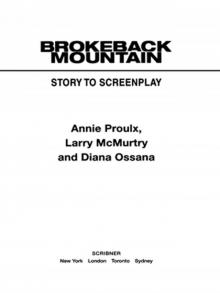 Brokeback Mountain
Brokeback Mountain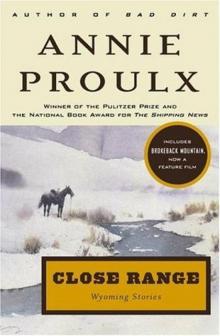 Close Range
Close Range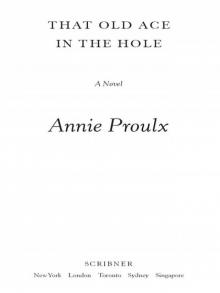 That Old Ace in the Hole
That Old Ace in the Hole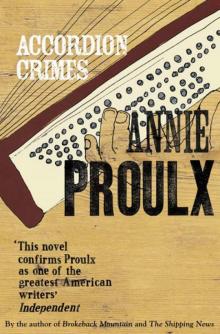 Accordion Crimes
Accordion Crimes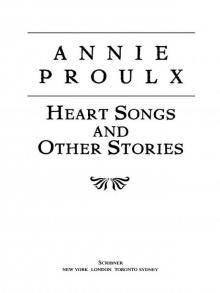 Heart Songs and Other Stories
Heart Songs and Other Stories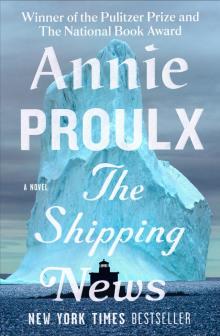 The Shipping News
The Shipping News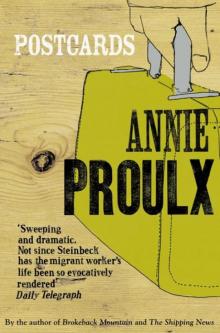 Postcards
Postcards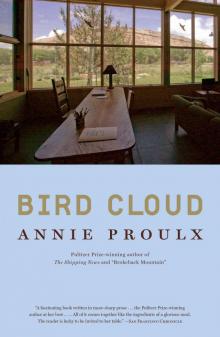 Bird Cloud
Bird Cloud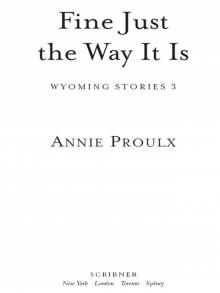 Fine Just the Way It Is
Fine Just the Way It Is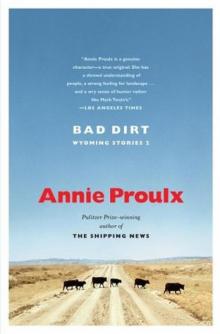 Bad Dirt
Bad Dirt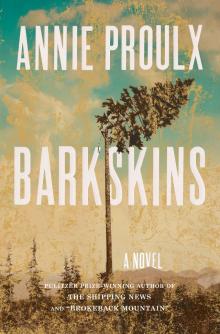 Barkskins
Barkskins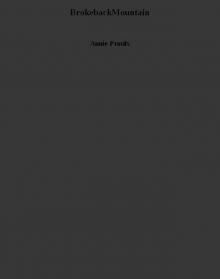 BrokebackMountain
BrokebackMountain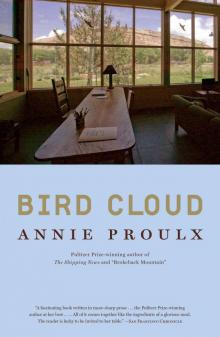 Bird Cloud: A Memoir of Place
Bird Cloud: A Memoir of Place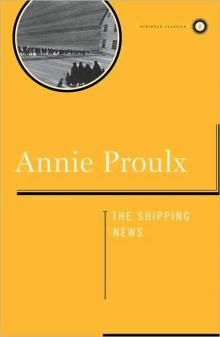 Shipping News_A Novel
Shipping News_A Novel